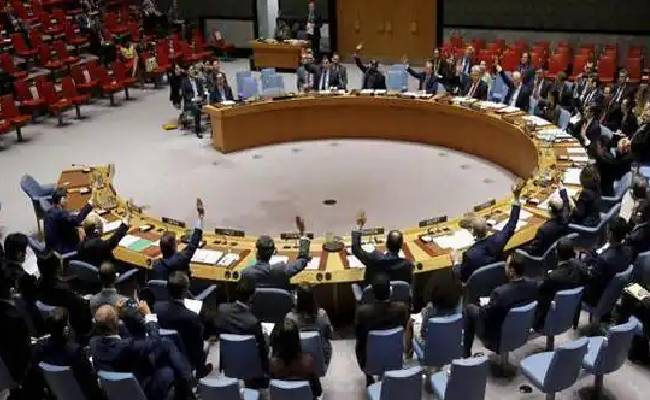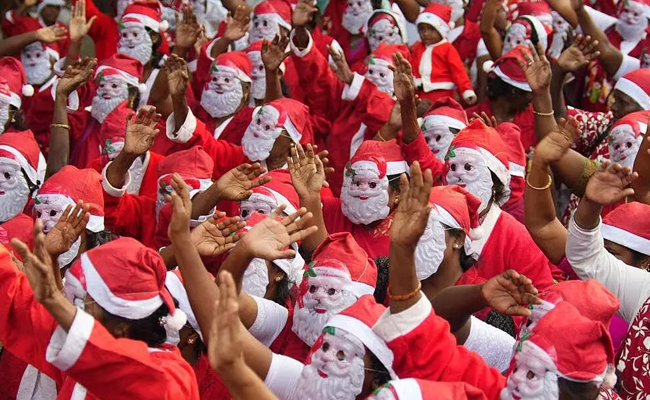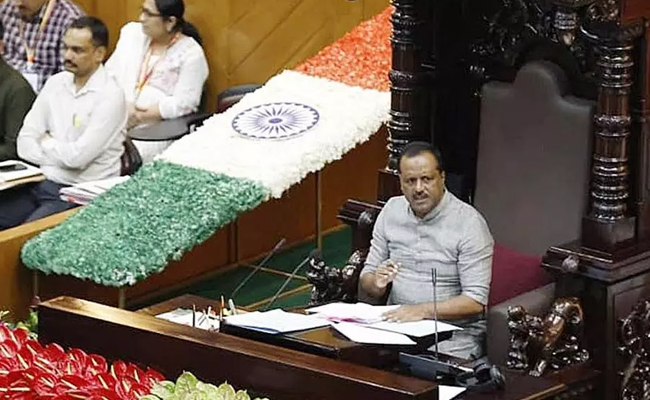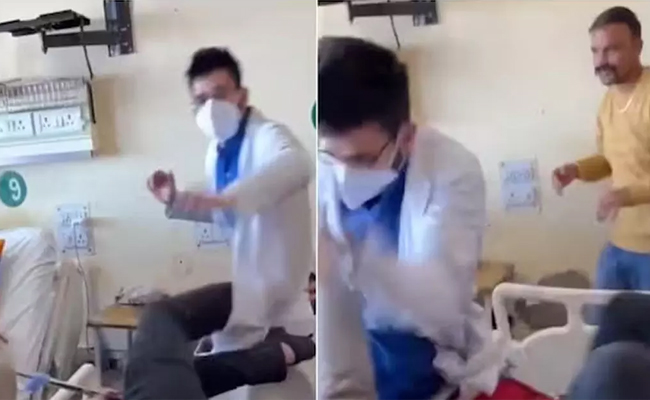United Nations,(PTI): The UN Security Council on Wednesday failed to adopt a Brazil-led draft resolution that would have called for humanitarian pauses in the ongoing Israel-Hamas conflict to allow full access for aid to the Gaza strip after the US vetoed the text.
The US, a permanent member of the UNSC and a close ally of Israel, said it is disappointed the resolution makes no mention of Israel's rights of self-defence.
The 15-nation Council met to vote on the draft resolution that was proposed by Council President Brazil.
While 12 Council members voted in favour of the resolution, Russia and Britain abstained. The resolution could not be adopted because of a veto cast by the US.
This was the second time in two days that the Council failed to adopt a resolution on the situation in the Middle East.
On Monday, the Security Council rejected a draft resolution proposed by Russia on the situation in Gaza that would have called for a humanitarian ceasefire but did not mention the militant group Hamas which launched an audacious attack against Israel on October 7.
The Brazil-led resolution would have firmly condemned all violence and hostilities against civilians and all acts of terrorism, and unequivocally rejected and condemned the heinous terrorist attack by Hamas on October 7.
The resolution would have also called for humanitarian pauses to allow full, rapid, safe and unhindered humanitarian access for United Nations humanitarian agencies and their implementing partners, and encouraged the establishment of humanitarian corridors and other initiatives for the delivery of humanitarian aid to civilians.
It would have also called for the rescission of the order by Israel for civilians and UN staff to evacuate all areas in Gaza north of the Wadi Gaza and relocate in the southern part of the strip.
US Ambassador to the UN Linda Thomas-Greenfield, in her explanation of the vote, said that the Council is meeting at a time when President Joe Biden is in Israel.
His trip is a "clear demonstration of the fact that the United States is actively engaging at the highest levels: to secure the release of hostages; to prevent the conflict from spreading; to stress the need to protect civilian lives; to address the humanitarian crisis facing Palestinians in Gaza; and to demonstrate to the Israeli people that the United States stands with them in their time of sorrow and need."
She said the US is "disappointed" that the Brazil-led resolution made no mention of Israel's rights of self-defence.
"Like every nation in the world, Israel has the inherent right of self-defence, as reflected in Article 51 of the UN Charter. Following previous terrorist attacks by groups such as al-Qaeda and ISIS, this Council reaffirmed that right. This text should have done the same," she said.
She asserted that when the US talks about the protection of civilians, it means all civilians.
She said the US is "horrified and saddened" by Tuesday's "explosion" at the Al Ahli hospital in Gaza that killed hundreds. "We mourn this tragic, tragic loss of life.
On the humanitarian front, we're working with Israel, its neighbours, the United Nations and other partners to address the humanitarian crisis in Gaza," she said.
"Let's be clear: Hamas' own actions have brought this on this severe humanitarian crisis in Gaza. And Hamas has caused so much needless suffering, death, and destruction. Every Member State should condemn Hamas' terrorism and cruelty. And every Member State should call on Hamas to cease its endless barrage of rockets against Israel. This is not complicated. It's not controversial. This is the bare minimum," she said.
The US envoy added that Washington is on the ground doing the hard work of diplomacy and while the US recognises Brazil's desire to move the text forward, "we believe we need to let that diplomacy play out", especially when UN Secretary-General Antonio Guterres, President Biden, US Secretary of State Antony Blinken and regional actors are "engaged in intensive dialogue on the very issues we are deliberating on today."
Russia's Permanent Representative to the UN Vassily Nebenzia said the Council has witnessed once again the "hypocrisy and the double standards" of the US and Washington really did not want that any solution should be arrived at in the Council.
Following the vote, Brazil's Permanent Representative at the UN S rgio Fran a Danese voiced deep regret over the failure of the Council to act and adopt the resolution to deal with the humanitarian crisis in Gaza.
He said the Security Council's paralysis in the face of a humanitarian catastrophe is not in the interest of the international community.
"Sadly, very sadly, the Council was yet again unable to adopt a resolution on the Israeli-Palestinian conflict. Again, silence and inaction prevailed, to no one's true long-term interest. While we deeply regret that collective action is made impossible in the Security Council, we do hope that efforts by other actors will yield positive results.
They must be prompt, effective and substantial," the Brazilian envoy said, adding that hundreds of thousands of civilians in Gaza cannot wait any longer. "Actually they have waited for far too long, to no avail."
UK's Permanent Representative Ambassador Barbara Woodward said the draft resolution needed to be clearer on Israel's inherent right to self-defence in line with the UN Charter after Hamas' attacks killed over 1400 people and took almost 200 people hostage.
"The draft resolution also ignored the fact that Hamas is using innocent Palestinian civilians as human shields. They have embedded themselves in civilian communities and made the Palestinian people their victims too. For these reasons, the United Kingdom abstained on this resolution," Woodward said.
Meanwhile, the UN Human Rights Watch criticised the move by the US.
Louis Charbonneau, UN director at Human Rights Watch, said once again, the US cynically used their veto to prevent the UN Security Council from acting on
Israel and Palestine at a time of unprecedented carnage.
"In so doing, they blocked the very demands they so often insist upon in other contexts: all parties to comply with international humanitarian law and ensure that vital humanitarian aid and essential services reach people in need. They also blocked condemnation of the Hamas-led October 7 attack and demand for the release of the hostages. In light of the council's deadlock, UN member countries should ask the General Assembly to take urgent action to protect civilians and prevent large-scale atrocities and further loss of life," Charbonneau said.
Let the Truth be known. If you read VB and like VB, please be a VB Supporter and Help us deliver the Truth to one and all.
Palakkad: A group of children celebrating Christmas through a carol roadshow was allegedly attacked by BJP workers in Kerala’s Palakkad district on Sunday night.
According to local reports, the incident occurred in Pudussery area of Palakkad, where over 25 children, mostly aged around 13, were moving from house to house singing Christmas carols. Reports state that a BJP worker identified as Ashwin Raj, along with others, allegedly assaulted the children and vandalised their musical equipment.
According to the police and eyewitness accounts, the children were using a band set that belonged to a local CPI(M) office, which had the party’s name written on it.
Allegedly objecting to this, the accused and his associates reportedly lured the children on the pretext of offering them money and then assaulted them. The band set used by the children was also smashed.
ALSO READ: Punjab: Duped of Rs 8 crore in cyber fraud, ex-IPS officer Amar Chahal shoots self in Patiala
The Town Police have arrested Ashwin Raj, a local BJP worker who has been named as the prime accused in the case. Efforts are underway to trace and arrest the remaining accused who fled the scene.
Speaking to the media, one of the injured children said, “We were using the band just for fun. When they saw that it had CPM written on it, they took us aside and beat us.”
"We had given the band set that was in our office out of love when the children asked for it. The fact that these young children, who do not know the intricacies of politics, were attacked shows the criminal mentality of the BJP workers," local CPIM leaders expressed outrage.
A police officer told PTI that the arrested accused is already booked under the Kerala Anti-Social Activities (Prevention) Act (KAAPA).
The sections invoked include Section 192 (provocation with intent to cause a riot), Section 115(2) (voluntarily causing hurt), and Section 110 (attempt to commit culpable homicide), police added.





